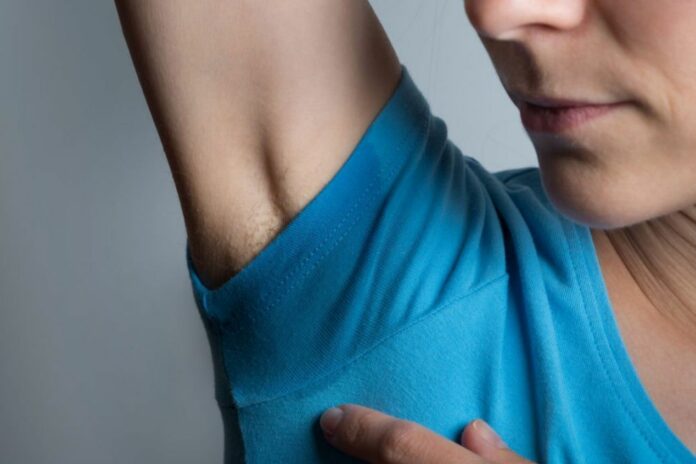Sweating Out Social Anxiety: Can the Smell of Sweaty Armpits Alleviate Social Anxiety Woes?
Researchers have discovered a unique method for treating social anxiety: utilizing the body odors from other people’s sweat.
European scientists have uncovered a potentially groundbreaking treatment for mental health issues, specifically social anxiety.
Their research demonstrates that exposure to human odors, derived from the sweat of other individuals, could enhance existing therapeutic approaches for mental health disorders.
In a preliminary investigation, researchers found that social anxiety levels decreased when participants engaged in mindfulness therapy while being exposed to human ‘chemo-signals,’ commonly known as body odor, collected from the underarm sweat of volunteers.
At the European Congress of Psychiatry in Paris, Ms. Elisa Vigna from the Karolinska Institute in Stockholm presented the findings of a pilot study, stating:
“Our state of mind causes us to produce molecules (or chemo-signals) in sweat which communicate our emotional state and produce corresponding responses in the receivers.”
The findings “show that combining these chemo-signals with mindfulness therapy seem to produce better results in treating social anxiety than can be achieved by mindfulness therapy alone.”
Social anxiety is a prevalent mental health issue characterized by excessive concern about engaging in social settings. It can impact various aspects of life, such as workplace interactions, relationships, and even routine activities like shopping or going on holidays. This heightened worry about interacting with others can make it challenging for individuals to lead a normal life without experiencing constant anxiety.
In the study, researchers collected sweat samples from volunteers and exposed patients to chemo-signals extracted from these samples during their social anxiety treatment. The sweat was gathered from volunteers as they watched short movie clips, specifically chosen to evoke distinct emotions like fear or happiness, in order to determine if the emotions experienced during perspiration influenced the treatment outcomes. Fearful clips included scenes from horror films like The Grudge, while ‘happy’ clips featured moments from Mr. Bean’s Holiday, Sister Act, and other similar movies.
After collecting the sweat, researchers enlisted 48 women aged between 15 and 35, all of whom experienced social anxiety. They were divided into three groups of 16 people each. Over a two-day period, all participants underwent mindfulness therapy for social anxiety. Simultaneously, each group was exposed to a distinct odor derived from the sweat samples of individuals who had watched different types of video clips. A control group was exposed to clean air instead.
They discovered that the women in the group exposed to sweat from individuals who had watched either funny or fearful movies demonstrated a better response to mindfulness therapy than those who were not exposed. Interestingly, the emotional state of the person producing the sweat did not impact treatment outcomes—sweat produced during happiness had the same effect as that from someone frightened by a movie clip. This suggests that there may be a general property of human chemo-signals in sweat that influences treatment responses.
According to Ms. Vigna, it is possible that the mere presence of another person has this effect, but further confirmation is required. Currently, a follow-up study is being conducted with a similar design, with the addition of sweat samples from individuals watching emotionally neutral documentaries. This will enable the researchers to determine whether any potential therapeutic benefits arise from unconscious perception of specific emotional signals or simply from the presence of another human being, regardless of emotion.
Ms. Vigna noted that individuals who underwent a single session of mindfulness therapy and were also exposed to human body odors experienced a significant reduction of approximately 39% in their anxiety scores. In comparison, the control group, which only received mindfulness therapy, showed a reduction of approximately 17% in anxiety scores after one treatment session. The researchers are optimistic that this may offer a new approach to assisting people with Social Anxiety Disorder by improving the effectiveness of standalone e-health interventions, such as meditation apps, or by providing an additional option for those who do not respond to current treatments. However, they caution that this is a proof-of-concept study and therefore plan to conduct a larger study to verify the findings.
Human sweat is a complex substance that can carry information in a highly variable manner. To investigate its potential therapeutic benefits, the researchers are collaborating with analysts from the University of Pisa who have identified more than 300 distinct compounds in human sweat. By identifying and isolating the specific molecules that contribute to the observed effects, the researchers hope to facilitate the development of more effective therapeutic interventions. This research is part of the POTION project (Promoting Social Interaction through Emotional Body Odors), which is funded by the European Union’s Horizon2020 initiative.
Dr. Julian Beezhold, Secretary General of the European Psychiatric Association at the University of East Anglia, who was not involved in the study commented:
“We welcome this study, looking at one of the least researched senses and its interaction with mental health. The findings are interesting but will need to be robustly replicated by independent researchers.”
Image Credit: Getty
